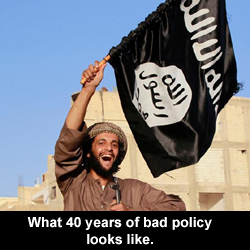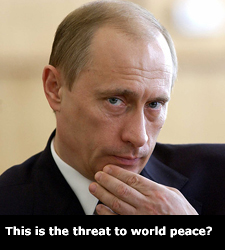Another week of wall-to-wall reporting on the Russian invasion of Ukraine. That characterization of the operation is tantamount to a federal offense now in Russia. Whereas there they use force to make people think a certain way, over here we use the Edward Bernays method. That’s why polling shows a majority of Americans wanting the President to be “tougher” in his approach to the Ukraine crisis.
Majority support for policies that could easily result in total nuclear annihilation doesn’t occur in a vacuum. Reporting on the atrocities Russia is committing in Ukraine flows in a constant stream from the corporate media. To be clear, it is 100% something that should be reported on heavily. But this is more than coverage. It is an influence campaign, and it may just get us all killed.
A game of absolutes
One of the sure signs that the networks are propagandizing us is the characterization of this war as part of a broader struggle between freedom and tyranny. Even Chris Hayes went on a tear about his last week, bizarrely extending this metaphor to the Cold War era. This claim doesn’t stand up to even the slightest scrutiny. Did we fight our near-genocidal war in Vietnam for “freedom”? I think not. Read Nick Turse’s Kill Anything That Moves. This is not good vs. evil, for we are not good.
Now, I expect this kind of thing out of the likes of Joe Scarborough, who is constantly laboring at the Reagan myth, desperately trying to keep it alive for another generation. Even on his show you will hear from people counseling caution, like Richard Haas. Those are the exceptions, though. It’s mostly a chorus of voices bearing witness to the suffering of Ukrainians in minute detail, showing frustration out of a lack of action on the part of the administration. The absolutism of good vs. evil is an essential component in their argument.
More like 1914 … or 2003
Frequent MSNBC guest Michael McFaul is back on the network, having suffered no real penalty for his endorsement of a comparison between Putin with Hitler, in which Hitler came out ahead. He was on Twitter telling people to stop talking about World War III, which was odd because he seems so wrapped up in World War II. McFaul is a fan of brinkmanship with respect to Ukraine – he thinks we can get a lot closer to open conflict without risk of nuclear war.
This is what happens when people take their own analogies too seriously. This is not World War II. We have nuclear weapons – thousands of them. We cannot do the kinds of things we did before those weapons existed. It’s simply not an option. There are many reasons why this period is nothing like 1939, but the nuclear question is probably the most salient difference. In all honesty, if you’re going to compare this with a world war, the closer analogy is 1914, when an accidental war prompted Europeans to slaughter each other by the millions for no good reason.
Don’t burn bridges
I’ve said it before. There’s only one way out of this horrendous conflict, and that’s through some kind of negotiated settlement. Cranking up the rhetoric makes this less likely, not more. For the Ukrainians’ sake, it’s better to make the deal now than later when their country is in even more of a shambles and many thousands more have lost their lives.
Ultimately Russia and Ukraine are going to have to reconcile themselves to being neighbors. That’s never going to change – it’s just geography. They need to find a path out of this mess, and we need to do everything in our power to help them get there.
luv u,
jp


 The trouble with approaching these issues with an imperial mindset is that we are blind to our own failures while expressing righteous indignation over the failings of others. Russia’s military action in Syria is a good example. They are perhaps the fifth or sixth power to drop bombs in that unfortunate country. Their strategy, while militaristic and morally bankrupt, is not difficult to understand – they view Islamic radicalism as an extreme threat, and they make the not unrealistic assumption that the fall of Syria’s government would result in a failed state something like Libya or Somalia or Iraq (all of which are beneficiaries of our aforementioned bellicosity). So, like the U.S.’s support of Saudi’s murderous campaign in Yemen, they are applying force in support of Assad’s crumbling regime.
The trouble with approaching these issues with an imperial mindset is that we are blind to our own failures while expressing righteous indignation over the failings of others. Russia’s military action in Syria is a good example. They are perhaps the fifth or sixth power to drop bombs in that unfortunate country. Their strategy, while militaristic and morally bankrupt, is not difficult to understand – they view Islamic radicalism as an extreme threat, and they make the not unrealistic assumption that the fall of Syria’s government would result in a failed state something like Libya or Somalia or Iraq (all of which are beneficiaries of our aforementioned bellicosity). So, like the U.S.’s support of Saudi’s murderous campaign in Yemen, they are applying force in support of Assad’s crumbling regime. At the close of the Cold War, it was understood that expansion of NATO would be seen as provocative by Russia, but because Russia was in a weak position, their economy destroyed by massive privatization, shock therapy structural adjustment, guided by some of our Chicago-school fanatics, we felt free to ignore their concerns. That worked so long as our drunken ally Yeltsin was in command. But now that the extremely powerful Russian presidency (which we supported under Yeltsin) has been inherited by a sober ex-KGB officer, and the Russian economy has been lifted somewhat by oil revenues, they have found the confidence to voice their objections. And, of course, we’re shocked, shocked!
At the close of the Cold War, it was understood that expansion of NATO would be seen as provocative by Russia, but because Russia was in a weak position, their economy destroyed by massive privatization, shock therapy structural adjustment, guided by some of our Chicago-school fanatics, we felt free to ignore their concerns. That worked so long as our drunken ally Yeltsin was in command. But now that the extremely powerful Russian presidency (which we supported under Yeltsin) has been inherited by a sober ex-KGB officer, and the Russian economy has been lifted somewhat by oil revenues, they have found the confidence to voice their objections. And, of course, we’re shocked, shocked!